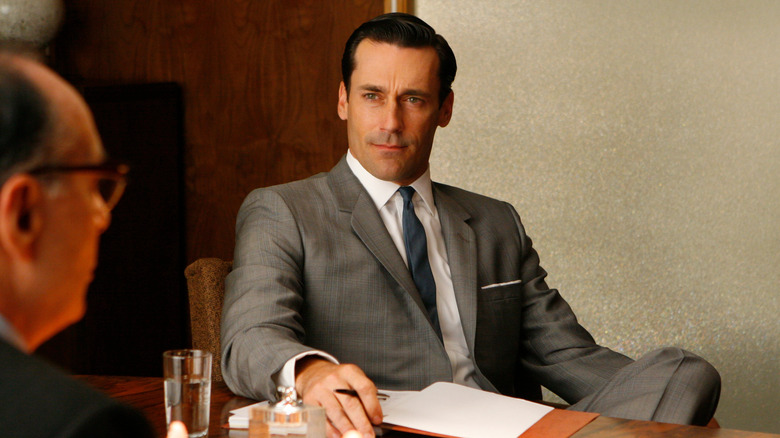Matthew Weiner Had A Jarring Reaction To Jon Hamm's Mad Men Audition
When it comes to any prestige anti-hero drama, getting the right actor for the main role is crucial. It's hard to imagine "The Sopranos" without James Gandolfini at the center, just as you can't imagine "Breaking Bad" without Bryan Cranston. When it came to finding the actor for Don Draper on "Mad Men," showrunner Matthew Weiner was originally hesitant to cast Jon Hamm for the role. Why? Because Hamm was a little too good looking.
Alan Taylor, a "Sopranos" director who was involved with the casting, explained their thought process:
"I think Matt [Weiner] and I, coming off Sopranos, both had a kind of bias because we had a wonderful experience with Jim Gandolfini, and there is a kind of superiority that goes along with that kind of casting—you know, look, we're not casting a movie star, we're casting a great actor."
After all, as great as Gandolfini was in the role, he wasn't considered to be a conventionally attractive Hollywood leading man, and that was part of his charm. He had the hairline and body-shape of a middle-aged mob boss, which was perfect for the character of Tony Soprano. The showrunners were worried that a Don Draper that was too attractive would take away from the authenticity of the show, but that changed when they saw Hamm's performance.
There was one defining quality to Hamm's performance that stuck out to Matthew Weiner straight away. After Hamm's first audition for the show, Weiner turned to the casting director and stated, "That man was not raised by his parents." Sounds like a bold assertion, but he was spot-on: Hamm's childhood had a few key similarities to Don Draper's.
Jon and Don: the many parallels
Throughout "Mad Men," viewers learned about Don's past through bits and pieces. He not only grew up poor, but his mother died in childbirth and he watched his father's death at a young age. Don was then raised by an abusive stepmother before running away and starting a new life the moment the opportunity arrived. It's a backstory that explains, if not necessarily excuses, a lot of Don's questionable behavior on the show. He's a man who's pretending to be someone who came from the same sort of wealth his co-workers came from. He's trying to be the perfect ideal man of the '60s, and we watch through seven seasons as the façade breaks down.
Hamm, meanwhile, lost his mother when he was 10 and had a difficult relationship with his father, who passed away when Hamm was 20. Weiner's assumption at the audition was correct: Hamm wasn't raised by his parents, but by his grandmother. It wasn't quite as extreme as what Don Draper went through, but it was perhaps what made Hamm a great fit for the role.
According to Alan Taylor, Hamm had "this wonderful sadness and lost quality in his eyes ... a rare quality for someone who's a strapping leading man." It was something Weiner believed Hamm's childhood contributed to; he told Vanity Fair that it not only helped give Hamm "the vulnerability" but also "the wit" required for the role. The fact that Hamm was attractive didn't hurt: "The most valuable thing on television and everywhere is when you find someone who is physically attractive and funny," Weiner said. "It's very unusual."

